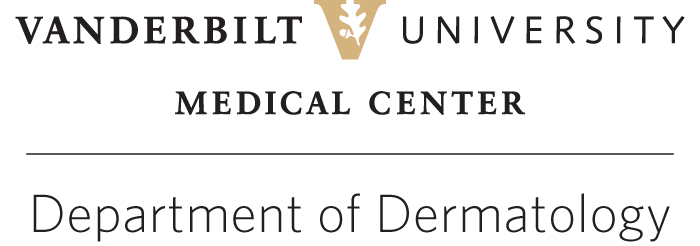Dermatopathology
The Vanderbilt Department of Dermatology offers this service to physicians throughout the U.S.
The goal of Vanderbilt Dermatopathology is to provide prompt, expert interpretation and analysis for referring physicians and their patients.
The benefits of our service include:
- Practicing dermatologists with expertise in various aspects of dermatology (melanocytic lesions, cutaneous lymphoma, rheumatic skin disease, bullous disease, alopecia, etc.) who strive to provide clinicopathological correlation.
- 24-hour turn-around time on routine cases.
- Immunohistochemical stains provided by the lab and ready the following day.
- Experienced immunoflourescence lab that provides both direct and indirect immunoflourescence studies.
- Flexible, secure results reporting and the ability to interface with most electronic medical record systems.
- Complimentary supplies and FedEx priority overnight/local courier service provided.
Diagnosis
The Vanderbilt Department of Dermatology is committed to providing the best possible service to both you and your patients. We strive to provide definitive diagnoses in a timely fashion and the majority of cases are finalized within 24 hours.
All members of our group are practicing dermatologists who see both general dermatology patients as well as those with specific complex dermatologic issues (cutaneous lymphoma, immunobullous disorders, alopecias, hereditary cancer syndromes, etc.) We are always available to discuss clinical findings and provide clinicopathologic correlation.
Submitting Specimens:
Specimens are placed in formalin and collected by couriers arranged by our partner, Opus Pathology, or sent to Opus via FedEx.
- Opus Pathology processes the tissue and generates the glass slides for analysis.
- Couriers deliver the slides to the Vanderbilt Dermatology at One Hundred Oaks for review the following morning. The majority of cases will be finalized and a report generated that day. Cases that require stains will generally be finalized the following day.
- Reports are faxed or imported into a variety of EMRs. Opus Pathology is able to work with the majority of EMR systems and if need be an interface can be created.
Billing is handled by Opus Pathology (billing as: PCA of Columbia DBA OPUS Pathology).
Immunoflourescence
Our laboratory provides the following diagnostic immunofluorescence (IF) tests:
- Direct IF on skin, oral mucosa, and conjunctiva
- Indirect split-skin IF on serum
This diagnostic immunopathology laboratory has been providing this service since 1983 and has processed over 20,000 specimens since its founding.
Split-skin normal human skin is used as our preferred tissue substrate for IF studies on serum, since it is more sensitive in detecting circulating anti-skin basement membrane autoantibodies than intact skin and provides the opportunity, if positive, to distinguish bullous pemphigoid from epidermolysis bullosa acquisita.
Indirect IF complement-fixation assay (for detection of circulating herpes gestationis factor) on serum can also be performed by special request.
Sending a Specimen for Immunofluorescence Testing
Direct Immunofluorescence
Place tissue specimen into the special transport media (Michels media provided by Opus Pathology). Store at room temperature. Complete immunofluorescence-specific requisition form and give to Opus Pathology courier or mail to Opus Pathology.
Indirect Immunofluorescence
Draw blood (5cc) into a serum-separator tube and store at room temperature. Complete immunofluorescence-specific requisition form and give to Opus Pathology courier or mail to Opus Pathology.
Biopsy Guidelines
Blistering Disorders
Biopsy approximately 1-2mm away for the edge of an active blister.
Vasculitis
Biopsy a new, active lesion, preferably less than 48 hours old. Try to avoid older or ulcerated lesions.
Connective Tissue Disease
Biopsy from within any portion of the lesion itself, preferably one that does not appear to have associated scar tissue. In the specific case of discoid lupus eythematosus, some active-appearing lesions that have been present for more than 3 months may have negative direct immunofluorescence findings as a result of inflammatory descruction of the basement membrane zone. In this particular setting a negtive study does not, by itself, imply a different diagnosis.
Our Dermatopathologists
Education
Every member of our group is committed to education. Dr. Bahrani teaches dermatology and pathology residents at the VA hospital. Drs. Boyd and Zwerner give weekly dermatopathology didactic sessions to dermatology residents and all members provide resident instruction in the Vanderbilt dermatology clinic at One Hunderd Oaks.
We are currently using technology to improve dermatopathology teaching for our residents, residents at other institutions and practicing dermatologists.
If you are interested in finding out more about these educational services, please email our team.
Opus Pathology
Opus Pathology is a community anatomic pathology laboratory servicing Tennessee and the contiguous states. They strive to maintain the highest standards in pathology services including efficient and timely tissue collection and processing, innovative technology and friendly customer service. A meaningful contribution to the patient's care is their highest priority.
Opus Pathology contact information:
1602 Hatcher Lane
Columbia, TN 38401
Toll Free: (800) 388-1294
Local: (931) 490-1000
Fax: (931) 381-7002



